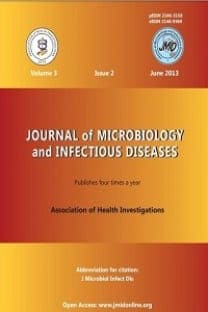First time isolation of Pseudomonas argentinensis from human skin infection
Pseudomonas argentinensis, MacConkey Kanlı Agar, Bakteriyel Tanımlama, Cilt Enfeksiyonu, Fucidin krem
First time isolation of Pseudomonas argentinensis from human skin infection
Pseudomonas argentinensis, MacConkey Blood Agar, Bacterial Identification, Skin infection, Fucidin.,
___
- API 20NE: Identification system for non-fastidious, non-enteric Gram-negative rods. http://www.netropica.org/ bacteriologia/ Api20NE%281%29.pdf. Accessed 6 November 2013.
- Rolfe B, Holloway BW. Alterations in host specificity of bacte- rial deoxyribonucleic acid after an increase in growth temper- ature of Pseudomonas aeruginosa. J Bacteriol 1966;92:43- 48.
- Barghouthi SA. A Universal Method for the Identification of Bacteria Based on General PCR Primers. Ind J Microbio 2011;51:430-444.
- BLAST. http://www.ncbi.nlm.nih.gov/blast/Blast. cgi?PROGRAM=blastn,BLAST_PROGRAMS=megaBlast PAGE_TYPE= BlastSearch, SHOW_DEFAULTS=on, LINK_ LOC=blasthome . Accessed 6 November 2013.
- Clustalw. http://www.genome.jp/tools/clustalw/. Accessed 6 Nov, 2013.
- Hudzicki J. http://www.microbelibrary.org/component/re- source/laboratory-test/3189-kirby-bauer-disk-diffusion-sus- ceptibility-test-protocol. Accessed 6 Nov 2013.
- European Committee on Antimicrobial Susceptibility Testing (EUCAST). Breakpoint tables for interpretation of MICs and zone diameters Version 3.1. http://www.eucast.org/fileadmin/ src/media/PDFs/EUCAST_files/Breakpoint_tables/Break- point _table_v_3.1.pdf. Accessed 6 November 2013.
- Tripathi P, Banerjee G, Saxena S, et al. Antibiotic resistance pattern of Pseudomonas aeruginosa isolated from pa- tients of lower respiratory tract infection. Afr J Microb Res 2011;5:2955-2959.
- El-Hady MA, Samy AA. Molecular Typing of Pseudomonas Species Isolated from Some Cultured Fishes in Egypt. Glob- al Vet 2011;7:576-580.
- Levy PY, Fenollar F, Stein A, et al. Propionibacterium acnes postoperative shoulder arthritis: an emerging clinical entity. Clin Infect Dis 2008;46:1884-1886.
- Peix A, Berge O, Rivas R, et al. Pseudomonas argentinensis sp. nov., a novel yellow pigment-producing bacterial species, isolated from rhizospheric soil in Cordoba, Argentina. Int J Syst Evol Microbiol 2005;55:1107-1112.
- Hariharan H, Matthew V, Fountain J, et al. Aerobic bacteria from mucous membranes, ear canals, and skin wounds of feral cats in Grenada, and the antimicrobial drug suscepti- bility of major isolates. Comp Immunol Microbiol Infect Dis 2011;34:129-134.
- Hot tub rash. http://www.skinsight.com/adult/pseudomonas- FolliculitisHotTubFolliculitis.htm. Accessed 6 November 2013.
- Sommkr S, Bojar R, Cunliffe WJ, et al. Investigation of the mechanism of action of 2% fusidic acid lotion in the treatment of acne vulgaris. Clin Exper Derm 1997,22:211-215.
- Nayak N, Verma L, Satpathy G, Venkatesh P. Propionibac- terium acnes endophthalmitis. J Clin Diag Res 2007;3:155- 158.
- Barghouthi SA, Hammad G, Kurdi M. Acinetobacter iwoffii induced cellulitis with allergy-like symptoms. Internet J Mi- crobiol 2012;10:12-17.
- ISSN: 2146-3158
- Yayın Aralığı: 4
- Başlangıç: 2011
- Yayıncı: Sağlık Araştırmaları Derneği
High imported malaria incidence at a Moroccon military hospital
Imane Tlamçani, Najoua Benseddik, Meryem Alami, Moncef Amrani, Salma Benjelloun, Ghita Yahyaoui, Mohammed Er-rami, Mohammed Karim Moudden, Mohamed El Baaj
Ary Habeeb, Nawfal Rasheed Hussein, Mahde Saleh Assafi, Samim A. Al-Dabbagh
First time isolation of Pseudomonas argentinensis from human skin infection
Sameer A. Barghouthi, KHALID YOUNIS
Utility of PCR in the Diagnosis of Female Genital Tuberculosis
Manmeet Kaur Gill, Aruna Aggarwal
A rare case of lymphoma diagnosed with performing liver biopsy due to chronic Hepatitis B
Zeynep Türe, Hülya Akgün, Hayati Demiraslan
In vitro efficacy of fosfomycin against clinical strains
Adil Karadag, Yeliz Tanriverdi Caycı, Kemal Bilgin, Murat Gunaydin, Cafer Eroglu
Occupational exposures among healthcare workers: A teaching hospital sample
Derya Ozturk Engin, Asuman Inan, Nurgul Ceran, Zeynel Abiddin Demir, Özgür DAĞLI, Ozgur Dagli, Emin Karagul, Seyfi Ozyurek
A treatable cause of ataxia: Tabes dorsalis
Mehmet Uğur Çevik, Abdullah Acar, Ertuğrul Uzar, Fatma Ünan, Saim Dayan
A case: Acute myocardial infarction in a child due to spider bite
